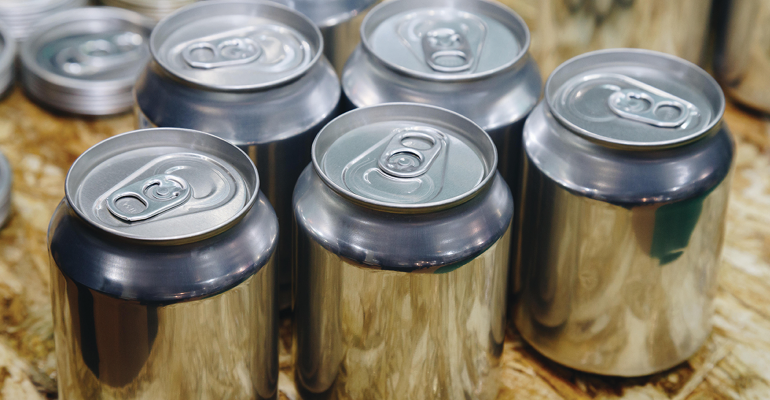Aluminum beverage cans have been around since the 1960’s, though have fielded tough competition since the birth of plastic bottles and an ongoing fierce surge in plastic packaging production. But lately, more brands are switching to aluminum containers, and not just to hold drinks.
Aluminum packaging has a good sustainability profile given that its carbon footprint continues to decrease and that the aluminum can be infinitely recycled.
Since 2005, the U.S. aluminum industry has reduced greenhouse gas emissions by 59 percent. Looking specifically at the aluminum beverage can, the North American carbon footprint has declined 41 percent since 2012. These reductions have been driven largely by decreased carbon intensity of primary aluminum production in North America, lighter cans (27% lighter per fluid ounce compared to 1991), and more efficient manufacturing operations. It also helps that the average aluminum beverage can manufactured in the United States contains 73 percent recycled content. Making an aluminum beverage can solely from recycled content entails 80 percent less emissions than making one from primary aluminum.
Its infinite recyclability, combined with that most households have access to a recycling program that accepts all aluminum packaging given its relatively high economic value, light weight, and ease of separation, is why aluminum packaging has high recycling rates and why 75 percent of all aluminum ever produced is still in circulation.
In 2020, 45 percent of aluminum beverage cans were recycled in the United States. That translates into 46.7 billion cans, or nearly 90,000 cans recycled every minute. Put another way, 11 12-packs of aluminum beverage cans per American were recycled in the United States in 2020.
As consumers demand packaging that is more sustainable, which starts with working in today’s recycling system, more beverages are shifting to aluminum beverage cans. One way to see that is in the growth of North American beverage launches in aluminum beverage cans. In 2018, it was 69 percent. It shot up to 81 percent in 2021.
Here’s some specific examples of switches:
The University SUNY New Paltz in 2020 negotiated with its beverage vendor to have its vending machines go from offering drinks in plastic bottles to only offering them in aluminum cans.
Danone, Coca-Cola, and Pepsi are starting to offer some of their water brands in cans.
A variety of craft brewers have switched from bottles to cans such as Lakefront Brewery, Anderson Valley Brewing Company, and Alley Kat Brewing.
On the aluminum beverage can front, aluminum can sheet producers and beverage can manufacturers that are CMI members collectively set in late 2021 U.S. aluminum beverage can recycling rate targets. These include going from a 45 percent recycling rate in 2020 to a 70 percent recycling rate in 2030.
CMI then published in mid-2022 its Aluminum Beverage Can Recycling Primer and Roadmap, which details how these targets will be achieved. Importantly, CMI is clear that these targets will not be achieved without new, well-designed recycling refund (i.e., beverage container deposit return systems). Modeling featured in the report finds that a well-designed, national recycling refund system could increase the U.S. aluminum beverage can recycling rate 48 percentage points.
Over the years, numerous third parties have conducted independent studies comparing the relative greenhouse gas impact of aluminum cans, PET (plastic), and glass bottles. In virtually every case, these studies found that the life cycle carbon impact of aluminum beverage cans is similar if not superior to PET (on a per ounce basis), and in every case superior to glass.
Furthermore, virtually all of these studies found that aluminum cans outperform PET (and glass) in terms of energy usage.
Aluminum cans outperform PET for carbonated beverages, but PET has a lower carbon impact for non-carbonated beverages. This is likely because non-carbonated beverages do not require as much plastic as carbonated beverages.
Post time: Feb-25-2023







